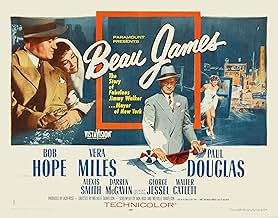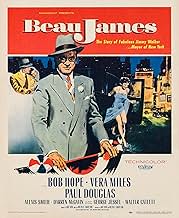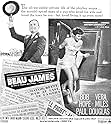AVALIAÇÃO DA IMDb
6,7/10
503
SUA AVALIAÇÃO
Adicionar um enredo no seu idiomaBiopic of the political career of Jimmy Walker, flamboyant and somewhat corrupt Mayor of New York City from 1926-1932.Biopic of the political career of Jimmy Walker, flamboyant and somewhat corrupt Mayor of New York City from 1926-1932.Biopic of the political career of Jimmy Walker, flamboyant and somewhat corrupt Mayor of New York City from 1926-1932.
- Direção
- Roteiristas
- Artistas
Eric Alden
- Reporter
- (não creditado)
Babette Bain
- Puerto Rican Child
- (não creditado)
Russ Bender
- Reporter
- (não creditado)
Jack Benny
- Jack Benny
- (não creditado)
John Benson
- Photographer
- (não creditado)
- Direção
- Roteiristas
- Elenco e equipe completos
- Produção, bilheteria e muito mais no IMDbPro
Avaliações em destaque
Having watched this movie many times -- it's in my library, I firmly believe that the role could only have been played by Bob Hope. To my mind, this is his best performance. That coupled with an excellent cast, highlighted by the duet with Jimmy Durante (and Jack Benny's cameo) make this a thoroughly enjoyable movie to watch -- just for fun. >
Based on the charmingly cleaned up biography of a minor but colorful figure in New York history, sometime songwriter/Mayor James J. ("Gentleman Jimmy") Walker, this unjustly neglected Paramount film was a healthy success in its day but has not (as of this writing) been made available on DVD despite an outstanding cast and ties to truly remarkable figures in entertainment and history. One of Bob Hope's warmest, most thoughtful performances, it should be rescued from the occasional "fool screen" broadcast and made available in a good VistaVision release reflecting the original.
The no less fictionalized musical biography of Walker's successor as Mayor of New York, Fiorello H. LaGuardia (the sadly unfilmed FIORELLO), won a Pulitzer Prize and tied with THE SOUND OF MUSIC for the Tony as Best Musical of 1959, but Fowler's biography of Walker with Hope in the lead (looking nothing like Walker, but beautifully capturing Fowler's idea of Walker's character) was as good as it got for Gentleman Jimmy - the less well cast 1969 musical (JIMMY, inflicted on Broadway by movie mogul Jack L. Warner) suggested by the same book but with far less skilled hands writing (BEAU JAMES' director, Melville Shavelson was one of the writers) died a painful death in just over two months (October 23, 1969-January 3, 1970, at the Winter Garden Theatre after a tryout at Philadelphia's Forrest Theatre; a long out-of-print Broadway Cast Album of the enjoyable but uneven score on RCA LSO 1162 is all that survives.) In the movie, the glamorous Alexis Smith (Tony Award, Best Actress in a Musical for 1971's FOLLIES) furthered her reputation as Hollywood ice princess as Walker's unappreciated but sympathetic wife, Allie, and had to work hard to allow audiences to believe that Bob Hope's finely layered but (on screen anyway) naive Walker would leave *her* for Vera Miles higher billed chorus girl, Betty Compton.
The film does make New York at the end of the "Roaring Twenties" almost a co-equal character in the piece, and appearances of several real life characters from the era (Jimmy Durante, Jack Benny and others) add to the impression beautifully - as does the deft narration from Fowler's book appropriately read by Walter Winchell.
It isn't great history or even great Hollywood, but it is a very warm, enjoyable film well worth a look - and a great example of how "bad" casting (Hope's lack of *physical* resemblance to Walker) can be brilliant if it gets the *psychology* right. When they tried to musicalize the idea a decade later, the production was probably dead the moment they cast the skinny impressionist/actor Frank Gorshin (who actually did bear a passing resemblance to Walker) in the Hope role. All the qualities Gene Fowler infused in his book (to MAKE the reader and later, viewer of the movie, feel "warm and forgiving all day long") disappeared. The movie understood this - and you will.
The no less fictionalized musical biography of Walker's successor as Mayor of New York, Fiorello H. LaGuardia (the sadly unfilmed FIORELLO), won a Pulitzer Prize and tied with THE SOUND OF MUSIC for the Tony as Best Musical of 1959, but Fowler's biography of Walker with Hope in the lead (looking nothing like Walker, but beautifully capturing Fowler's idea of Walker's character) was as good as it got for Gentleman Jimmy - the less well cast 1969 musical (JIMMY, inflicted on Broadway by movie mogul Jack L. Warner) suggested by the same book but with far less skilled hands writing (BEAU JAMES' director, Melville Shavelson was one of the writers) died a painful death in just over two months (October 23, 1969-January 3, 1970, at the Winter Garden Theatre after a tryout at Philadelphia's Forrest Theatre; a long out-of-print Broadway Cast Album of the enjoyable but uneven score on RCA LSO 1162 is all that survives.) In the movie, the glamorous Alexis Smith (Tony Award, Best Actress in a Musical for 1971's FOLLIES) furthered her reputation as Hollywood ice princess as Walker's unappreciated but sympathetic wife, Allie, and had to work hard to allow audiences to believe that Bob Hope's finely layered but (on screen anyway) naive Walker would leave *her* for Vera Miles higher billed chorus girl, Betty Compton.
The film does make New York at the end of the "Roaring Twenties" almost a co-equal character in the piece, and appearances of several real life characters from the era (Jimmy Durante, Jack Benny and others) add to the impression beautifully - as does the deft narration from Fowler's book appropriately read by Walter Winchell.
It isn't great history or even great Hollywood, but it is a very warm, enjoyable film well worth a look - and a great example of how "bad" casting (Hope's lack of *physical* resemblance to Walker) can be brilliant if it gets the *psychology* right. When they tried to musicalize the idea a decade later, the production was probably dead the moment they cast the skinny impressionist/actor Frank Gorshin (who actually did bear a passing resemblance to Walker) in the Hope role. All the qualities Gene Fowler infused in his book (to MAKE the reader and later, viewer of the movie, feel "warm and forgiving all day long") disappeared. The movie understood this - and you will.
This is the closest thing to a good dramatic performance Bob Hope ever gave...and its pretty good. Of course, the film soft pedals and simplifies: Walkers great antagonists, Seabury and LaGuardia, barely appear in it. In fact, there is a great dramatic and tragic film waiting to be made of the Jimmy Walker story, with terrific roles for the actors who would portray the "little flower' LaGuardia, and the incorruptible, if cold -hearted, "man who rode the Tiger", Seabury, as well as Jimmy Walker ( not to mention his wife and mistress). Maybe Scorsese could do it someday.
I was a teenager when James J. Walker was the Mayor of New York. Bob Hope doesn't look anything like him but catches the essence of his exuberant spirits and lack of responsibility very well. The narration by Walter Winchell adds just the right touch.
Paul Douglas is perfect as the Tammany boss. Hope is especially terrific in the dramatic conflict and emotional scenes with both Alexis Smith and Vera Miles. It makes me wish Hope did more straight-up dramas. It is especially a shame in retrospect, because after Beau James, Hope really never had the opportunity to make a good movie again (unless you count Critic's Choice which I don't).
If you enjoy nostalgic sad-and-funny movies about New York, this is one for you.
Paul Douglas is perfect as the Tammany boss. Hope is especially terrific in the dramatic conflict and emotional scenes with both Alexis Smith and Vera Miles. It makes me wish Hope did more straight-up dramas. It is especially a shame in retrospect, because after Beau James, Hope really never had the opportunity to make a good movie again (unless you count Critic's Choice which I don't).
If you enjoy nostalgic sad-and-funny movies about New York, this is one for you.
Over all the many times I've seen this film, it never once occurred to me that it might actually be historically accurate. Nor did it occur to me that it would matter much either way. This is the perfect glossy 1950s Hollywood 'biopic'... a totally charming film, yet with more emotional depth and dramatic substance than most that were cranked out in this politically-delicate period.
For starters, there's a totally charming performance by Bob Hope. This was the perfect part for him: the chance to seriously play a character who was never quite serious. Hope makes the good times effervescent, and the sad times not quite so sad. He makes the central love affair between a man and a city seem completely believable. (Where in real life, obviously things could never be so simple.)
But the real star of this film is the City of New York itself. Not the 'real' city... the fabulous city of myth, as only Hollywood can spin that myth. Resonant with names that are familiar even to people who've never been within thousands of miles of New York, and evocative of a history that even New Yorkers probably recall only vaguely. Just as The Untouchables etched out a stark black-and-white portrait of 1920s Gangland Chicago, Beau James paints a fond, Technicolor memory of 1920s New York.
It's true that Bob Hope's performance, while perfect for the film, was perhaps not Oscar-worthy. (The question would be moot if the Academy had the brains to give out occasional Oscars for the great art of Comedy!) But no matter... Beau James is a well-polished gem of a movie for more reasons than just Hope. Yes, it's corny, and commercial, and formulaic... but in the best way. It romanticizes something that really deserves it.
I wish I was watching it right now...
For starters, there's a totally charming performance by Bob Hope. This was the perfect part for him: the chance to seriously play a character who was never quite serious. Hope makes the good times effervescent, and the sad times not quite so sad. He makes the central love affair between a man and a city seem completely believable. (Where in real life, obviously things could never be so simple.)
But the real star of this film is the City of New York itself. Not the 'real' city... the fabulous city of myth, as only Hollywood can spin that myth. Resonant with names that are familiar even to people who've never been within thousands of miles of New York, and evocative of a history that even New Yorkers probably recall only vaguely. Just as The Untouchables etched out a stark black-and-white portrait of 1920s Gangland Chicago, Beau James paints a fond, Technicolor memory of 1920s New York.
It's true that Bob Hope's performance, while perfect for the film, was perhaps not Oscar-worthy. (The question would be moot if the Academy had the brains to give out occasional Oscars for the great art of Comedy!) But no matter... Beau James is a well-polished gem of a movie for more reasons than just Hope. Yes, it's corny, and commercial, and formulaic... but in the best way. It romanticizes something that really deserves it.
I wish I was watching it right now...
Você sabia?
- CuriosidadesThis was Bob Hope's last film for Paramount Pictures.
- Erros de gravaçãoMayor Walker is in a parade near movie's end. In the background is a 1955 or 1956 Cadillac.
- Citações
Mayor James J. 'Jimmy' Walker: Goodbye... but remember this: the voters always get what they deserve. I wasn't the only chump in this city. It took a lot of you to elect me.
- ConexõesFollows A Canção da Vitória (1942)
Principais escolhas
Faça login para avaliar e ver a lista de recomendações personalizadas
- How long is Beau James?Fornecido pela Alexa
Detalhes
- Data de lançamento
- País de origem
- Idiomas
- Também conhecido como
- Beau James
- Locações de filme
- Empresas de produção
- Consulte mais créditos da empresa na IMDbPro
Bilheteria
- Faturamento bruto nos EUA e Canadá
- US$ 1.750.000
- Tempo de duração1 hora 45 minutos
- Proporção
- 1.85 : 1
Contribua para esta página
Sugerir uma alteração ou adicionar conteúdo ausente

Principal brecha
By what name was O Prefeito se Diverte (1957) officially released in India in English?
Responda




































